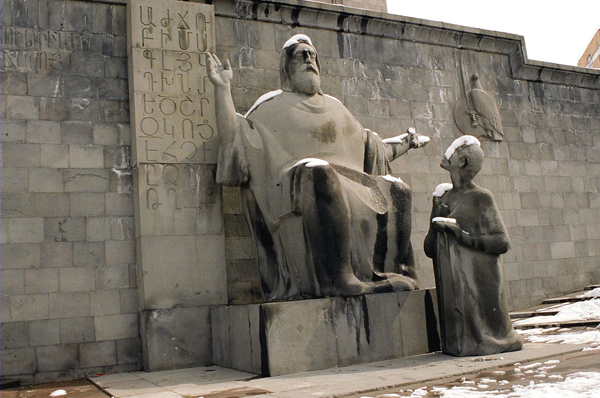Creation of own language realities
In a broad sense, translation is mutual adaptation of information, values during the interaction between individuals or groups of people. Probably you practiced the situation when you master the language very well, but when speaking to a person not knowing the language well you involuntarily begin to express yourself illiterately. Or from my own experience I can say – during an interview I unwittingly begin using the lexicon and phrases of my interlocutor in about 5-7 minutes. This “infection” is often an expression of a subconscious desire to understand and be understood.
Of course it happens that people or nations communicate with each other and remain oblivious. Such a case was described in Levon Ter-Petrosyan’s book “The Crusaders and Armenians”. “Over the course of co-existence for about two hundred years (during the Crusades – A.A.) no written memorial was translated from Arabic to Latin and vice versa. In this sense, the Latin East significantly differs from Spain and Sicily, where the progressing translation movement had a significant importance in terms of transmitting achievements of the Muslim thought to Europe. Thus, despite the great attention to the Crusades, they played a marginal role both for the fate of Europe and the East from the viewpoint of historical perspective.”
Fortunately, Armenians did not have the problem of such “obliviousness” neither during the mentioned period, nor before or after. In the nowadays Armenia this problem arose (I believe, temporarily,) during the recent 20 years, because for the preceding few decades, if not for one and a half century, the culture, civilization was being supplied from the “centre”, not only in Russian, but also through Russian language realities, by rupture of Russian culture. This will not happen anymore regardless of all the “customs stories” – even in case of a great desire, Russia does not have such material and political resources today. Therefore, there we have no alternatives for the development of Armenian, assimilation of foreign “texts” into our language, our culture realities.
However, people of my generation are still living with the stereotypes of the “centre” regardless of their Russian or Armenian education. I will bring a simple example: translation of American movies into Russian seems more organic to us than the Armenian version. And, vice versa, the Armenian reproductions of the films “Caucasian Captive” during the Soviet era are equally acceptable for us as their originals. Perhaps, the problem is related to the compliance of linguistic realities – Comrade Saakhov or Panikovsky can speak both Armenian and Russian with the same success. But, we better understand Forrest Gump in Russian.
Therefore, we need to establish new, own language realities. This is an issue for any interpreter. Sergei Khoruzhy, who is one of the translators of James Joyce’s “Ulysses”, wrote in the notes, “Fortunately, the diversity of the Russian language starting from Kiev and Bulgarian origins to the symbolism and street dialect of the beginning of the 20th century (Joyce times – A.A.) can be compared with all new European languages”. The point is that in one of the episodes (“Oxen of the Sun”) of his book, Joyce, alongside to everything else, is showing the evolution of language writing this part in English of various periods. We can add that Armenian also has such a rich history and a vivid proof of that is Samvel Mkrtchyan’s translation of the same work. It is wonderful that one of the most popular novels of the last century is available in Armenian. This means that Joyce’s world has found its Armenian reflection. This is equally important as invention of a system of Armenian terms in different sciences, which in our case is not so advanced in many areas.
In short – translate, translate, and translate in all the literal senses. But without purist extremeness… For instance, after reading the previous analysis one of the readers offered to replace the Armenian word “text” with an Armenian word, which is translated as “writing”. It’s suspicious. For instance, if I write “writing of gas contract”, 90% of “Aravot” readers will not understand me.
Aram ABRAHAMYAN
























































